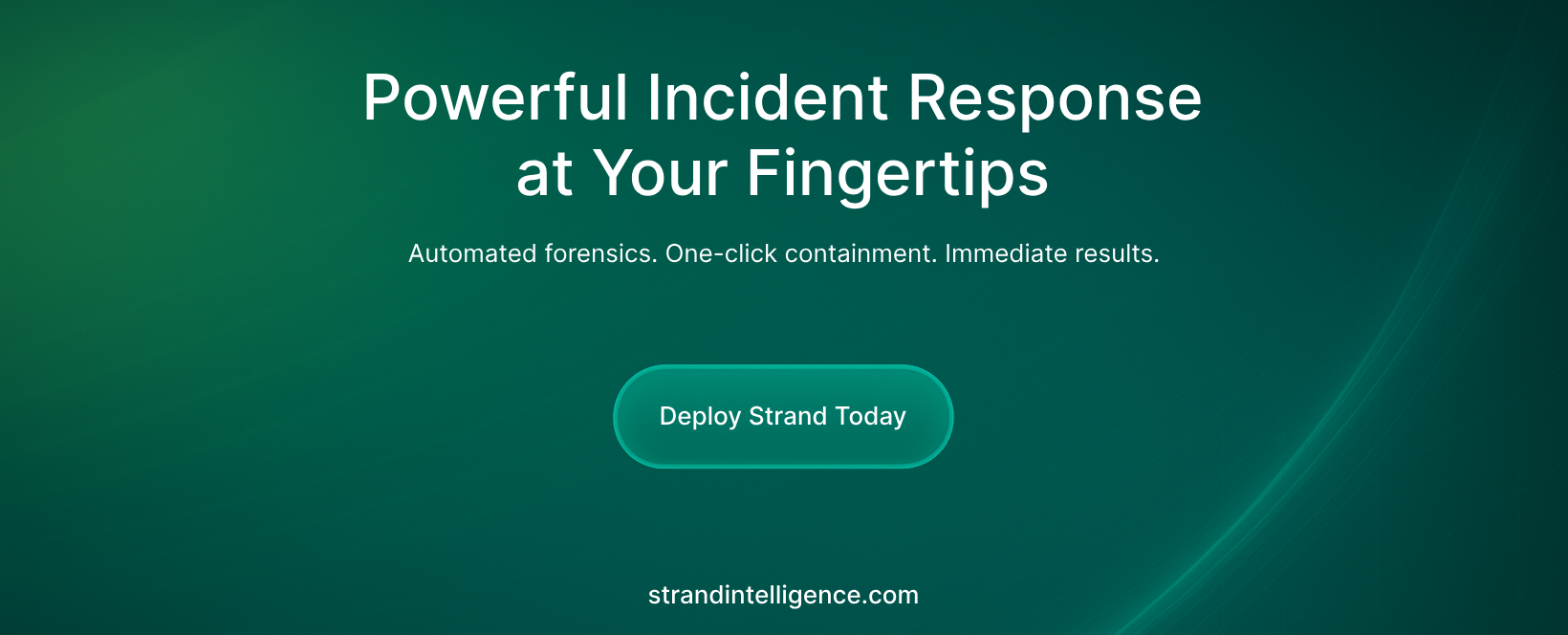Agentic AI: The Next Frontier in Reactive Incident Response

How Agentic AI Is Transforming Cybersecurity for MSPs and Security Teams
Digital Forensic Incident Response (DFIR) has traditionally been a high pressure and high complexity discipline. When a breach or compromise occurs, the reactive phase: investigating, containing, remediating, and reporting, all demands speed, precision, and clarity. Yet most organisations still rely on fragmented tools, manual processes, and external consultants to get the job done.
Now a new wave of AI innovation, Agentic AI, is set to fundamentally change how organisations respond to incidents.
Agentic AI introduces autonomous and goal driven systems that can handle the multi step complexity of incident response workflows. These intelligent agents operate with context, learn from past incidents, and take action across systems. They reduce time to containment and ease the operational burden on security teams and managed service providers (MSPs).
This article explores:
- What Agentic AI is and how it differs from traditional automation
- Why the reactive phase of IR is the most urgent and valuable point of intervention
- How Agentic AI enhances rather than replaces existing IR capabilities
- Use cases and benefits for MSPs and in house security teams
- Considerations around trust, governance, and safe deployment

What Is Agentic AI?
Agentic AI is the next evolution of artificial intelligence. It shifts from passive tools that generate responses to autonomous agents that act with intent. These agents:
- Understand defined goals
- Plan and sequence tasks to meet those goals
- Uses platform integration to execute tasks
- Learn and refine their behaviour based on outcomes
- Operate continuously with contextual memory and oversight
Most AI today is reactive and stateless. For example, chat assistants or document summarisation tools. Agentic AI is proactive, persistent, and capable of making real time operational decisions.
This makes it particularly well suited for structured and high consequence domains such as Incident Response.
The Reality of Reactive IR Today
When a security incident occurs, such as a ransomware infection, credential theft, or phishing compromise, the reactive phase begins. It typically looks like this:
- Identification: EDR and SEIM tools have failed, you have a threat actor in your infrastructure
- Investigation: Root cause analysis is performed, usually manually
- Containment and Remediation: Systems are isolated, credentials reset, and malicious activity removed - establish how to prevent this happening again
- Reporting: Documentation is assembled for stakeholders, clients, and regulators
Each of these steps is urgent, error prone, and operationally expensive. The reliance on external incident response partners or internal manual intervention causes delays that damage trust and increase risk exposure.
For MSPs, the impact is magnified. Slow IR execution threatens not only the client but also the provider’s reputation, retention, and profitability.
Key Benefits for Deploying Agentic Solutions to MSPs and Security Teams
1. Faster Time to Containment
Agentic AI reduces average time to containment from hours to minutes, shrinking attack windows and client exposure. Over 90% in many cases.
2. Reduced Operational Costs
Minimises the need for outsourced IR resources or on call internal staff, freeing up both time and budget.
3. Consistency and Repeatability
Playbooks are executed consistently without variation, improving both outcomes and compliance readiness.
4. Greater Client Confidence
Faster resolution and clearer reporting improve client perception of the MSP’s competence and capability.
5. Scalable Response Capacity
Agentic AI handles dozens of incidents simultaneously. Traditional teams cannot match this level of scale.

Designed to Augment, Not Replace
Agentic AI is not designed to replace human expertise. It is built to automate the steps that are repetitive, time consuming, and require no contextual judgment.
Agentic AI handles:
- High volume triage and classification
- Root cause mapping and evidence capture
- Workflow execution across security tools
- Routine reporting and compliance summaries
Human teams remain responsible for:
- Escalated or complex investigations
- Risk based decision making
- Client communications
- Oversight and governance
This division of labour ensures that skilled analysts are not overloaded with low value tasks and can focus on what matters most.
Governance, Safety and Trust
Deploying Agentic AI requires careful consideration of safety, oversight, and transparency. Key principles include:
- All actions must be fully logged and explainable
- Human override and rollback must be available at all times
- Integration boundaries and permissions must be clearly defined
- Deployment must align with regulatory, legal, and organisational policy
Strand has embedded these principles from day one, ensuring that trust is not only maintained but enhanced in high pressure incident environments.
Why Reactive IR Is the Ideal Starting Point
Agentic AI has future applications in threat hunting, detection engineering, and proactive defence. However, the reactive stage is where the benefits are immediate and measurable.
It is where:
- Time matters most
- Clients are watching closely
- Errors have irreversible reputational consequences
- Processes are known and repeatable
This makes it the perfect entry point for real world Agentic AI adoption.
Learn More
Strand is building the next generation of Agentic AI systems for reactive IR. Our platform is designed for MSPs, IR Firms and internal security teams who want to modernise their approach to incident response without losing control or visibility.
